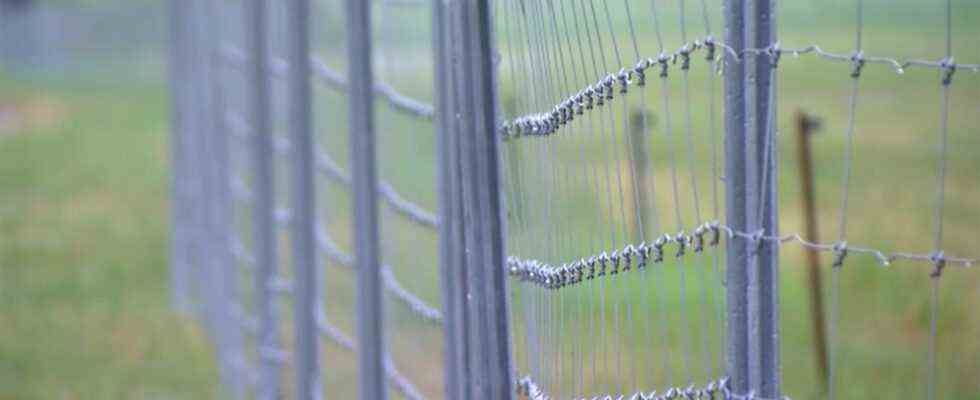Status: 07/10/2021 9:35 a.m.
Brandenburg is arming itself against African swine fever: protective measures are being tightened along the border with Poland. Local farmers fear for their livelihood and are pushing the pace.
“We’ll close it,” says Karina Dörk, district administrator for the Uckermark district in northeast Brandenburg. Then she pushes the 1.20 meter high fence field into the holder provided for it. Nine months after the first wild boars infected with African swine fever (ASF) were discovered in Brandenburg, the barrier along the Oder and Neisse rivers is ready, 255 kilometers of fence in Brandenburg alone. The sections in the neighboring federal states of Mecklenburg-Western Pomerania and Saxony have already been completed.
ASF has been detected in 1466 wild boars in all in eastern Germany – as of July 1st. In the districts affected, so-called core zones have been fenced off three kilometers around the sites and the area within a radius of 25 kilometers has been declared to be at risk. Inspection and driving bans apply here, farmers are only allowed to cultivate their areas to a very limited extent, and pig keepers have to lock the animals in the stables. Hunting is only allowed for disease control and there is intensive search for wild boar carcasses.
Last bulwark of Brandenburg?
“Brandenburg is currently the last bulwark against further expansion of the ASP to the west” – this was stated by the head of the local crisis team and state secretary for consumer protection, Anna Heyder-Stuffer, in a press release from her ministry in late June.
In addition, an effective containment of the ASF epidemic in Poland is currently not to be expected. It was also said that all efforts on the Polish side to also erect a common barrier had so far not led to success. In the neighboring country, more than 1,700 swine fever outbreaks have been reported since the beginning of the year.
The protective effect of the existing fence on the border to Poland is to be reinforced by a second fence.
Image: rbb
That is why Brandenburg wants to build a second fence – at least 500 meters away from the first. The aim is to create a corridor along the border in which the wild boars living there are to be killed and infected animals searched for. The head of the Brandenburg crisis team hopes that the protection zone can be completed by autumn if possible. The whole thing is to be financed with funds from the EU and funds from all other federal states. How, that is currently being worked out, said the State Secretary.
Was the fence late?
Norbert Meene sprinkles corn kernels into a three by four meter lattice trap. The farmer and hunter from Criewen in the Uckmark has been fishing for wild boars since the recent swine fever. The farmer doesn’t keep any domestic pigs, he looks after the bison in the national park. Meene would have preferred the protective fence much sooner. “We are already back in the phase in Germany: We are not fighting the ASP, we are administering it.” he says. “When it was said that the ASP was approaching the Oder 40 kilometers, the fence should have been built zack, zack.”
Farmers and hunters catch wild boar to prevent the spread of African swine fever.
Image: rbb
A view that the affected pig farmers in the region share in particular. According to the Brandenburg State Farmers Association, there are 13 farms directly in the core areas, they have a total of around 7200 domestic pigs. In addition, there are another 156 keepers with around 44,000 animals in the endangered zones.
In April the association’s first pig farmer had to give up. It was uneconomical for Karsten Ilse to continue the business. His farm is located in the middle of the part of the Märkisch-Oderland district affected by the ASP. The farmer has hardly got rid of the pigs – and if he does, then only with considerable price discounts. Only one slaughterhouse in Schleswig-Holstein has accepted cattle from the ASP exclusion zones.
Early call for help to the Chancellor
The Brandenburg farmer is not the only one. “A number of farms have already had to give up because of the consequences of the ASP, many more are facing ruin,” says a letter that the East German pig farmers’ associations had sent to Chancellor Angela Merkel in the spring. You should make the fight against swine fever a top priority, there is no coherent concept. It is essential to prevent the disease from spreading to domestic pig populations. The fall in prices and export bans to non-EU countries – especially to China – threatened the industry with losses running into billions.
Wild boars that die of African swine fever are a great danger to all wild and domestic pigs in the area.
Image: rbb
Federal Council appeals to the federal government
On the initiative of Brandenburg, among other things, the Federal Council passed a resolution immediately before the summer break in which the federal states asked the federal government for help for the farms concerned. Among other things, it is about a funding program, about support for research in animal disease control and about the endeavor to come to joint, effective steps with the Polish government to contain African swine fever.

